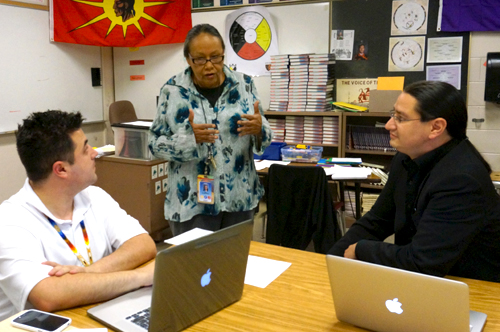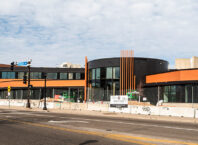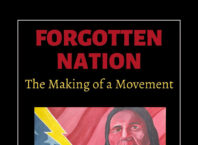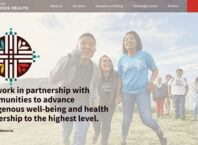
On the crisp, bright morning of
September 5, dozens of South High School students and staff gathered
together on the football field. After a few moments of brief chatting
and lingering, Robert “Animikii” Horton (Rainy River First
Nations), the new coordinator for the All Nations program, picked up
a microphone to welcome the group.
He greeted the assembly in the Ojibwe
language and asked that they all form a large circle. For the
remainder of the event, Native American students enrolled in the All
Nations program helped to smudge, sing at the drum and pray together
with their tobacco for a good school year.
The All Nations program is a
specialized academic option at South High School that was designed
specifically for Native students. Thoughtful integration of the
Ojibwe culture and language is the foundation for All Nations
academic approach.
The passion to revitalize Native
languages has ignited an internal fire within a growing number of
young adults specifically in Minnesota, where Dakota and Ojibwe are
the original languages. On any given day in Minnesota, fresh-faced
language warriors rise every morning on a mission to reclaim their
languages through education, social media, community gatherings,
apprenticeships and ceremonies. By any means necessary, they have
devoted their lives to Indigenous language acquisition.
Elizabeth Strong, 34, (Anishinaabe)
Coordinator for Language Projects for the Red Lake Economic
Development & Planning reflects on the first time she realized
she wanted to pursue this work, “I visited an immersion school in
Montana. Hearing those young children speaking their own language,
learning about their culture with their elders, it really struck a
chord with me."
From then on, she decided to journey
back home to be a part of the movement in Red Lake. A Head Start
immersion school was launched this year on the Red Lake reservation
as a proactive initiative toward restoring their unique dialect of
Ojibwe. The immersion teachers there work closely to gain knowledge
from a dream team of brilliant elders from the area. They are
focusing on developing curriculum, books, educational materials and
lesson plans to support the immersion experience.
These language advocates all agree
that there is a deep sense of urgency that intensifies with every
passing day as elders carrying priceless wisdom age more and more.
Ethan Neerdaels, Dakota Language
Society executive director, explained, “With a majority of our
speakers being over the age of 65, it is crucial that we focus on the
youth and encourage them to be the next generation of speakers.” He
encourages anyone wanting to learn more about language, history and
culture to take advantage of the opportunity to connect with their
elders. “Visit with them, ask them questions, be a good relative.”
Ojibwe Language professor at Bemidji
State University, Henry “Ginew Giizhik” Flocken, urges anyone
dedicating themselves to learning the language to start with tobacco.
This may seem like a fundamental concept, but for many Native people,
learning their own language is a very spiritual endeavor. As an
emerging elder in his community, the professor explained, “Our
language is a sacred gift from the Creator, we need to cherish and
nurture that gift.”
The spirit of the language is powerful
and a life changing event for students who embrace it as such.
Indigenous Linguist, James “Kaagegaabaw” Vukelich (Turtle
Mountain Ojibwe) shared his experience on his language learning, “The
Ojibwe language is the most elegant and sophisticated system I’ve
ever studied. It is given me the most fascinating view of life.”
He has worked for Minneapolis Indian
Education for over five years, developing Ojibwe language and culture
professional development opportunities for Minneapolis Public Schools
teachers. Most recently, he has created online programs for middle
school students to learn Ojibwe. Vukelich has also helped organize a
family language table, which is a collaboration with Dakota linguist
Neil McKay at Anishinabe Academy that is open to the
community.
This language table also helps
participants to explore having a deeper understanding of the Ojibwe
and Dakota worldview. He strongly believes that these values behave
as a fertile ground for our language to flourish. “Just as manoomin
(wild rice) requires a delicate balance within their ecosystem, our
language also needs an environment to survive in,” he said. “Living
mino-bimaadiziwin with our Grandfather teachings will allow the
language to grow.”
A multi-pronged approach to language
learning also includes living a certain way. Many language advocates
participate in ceremonies, where everything is done only Ojibwe or
Dakota. Flocken feels that he sees a positive shift in the past
twenty years. “It’s now OK to go to ceremony. It is no longer a
taboo. Our people are not afraid to talk about them.” Ceremonies
are also a great place to increase the connection of family. “Now
ceremonies are multi-generational. Kids see their parents learning
and it improves their lives.”
For anyone seriously considering the
journey of learning Indigenous languages, there is a strong network
of language advocates that will be there with you in this important
battle. Professor of Ojibwe at Saint Scholastica in Duluth, Mike
“Migizi” Sullivan strongly believes immersion and language usage
is the ultimate way to becoming fluent. To his fellow language
warriors, he encourages them to “be fearless and constantly reset
your goals.”
PHOTO:
Robert Horton and James Vukelich connect with Ida Downwin-Bald Eagle at
the South All Nationa Ojibwe language tavle to discuss strategies to
continue teaching Ojibwe both in the school and at home. (Photo by
Breanna Green)






